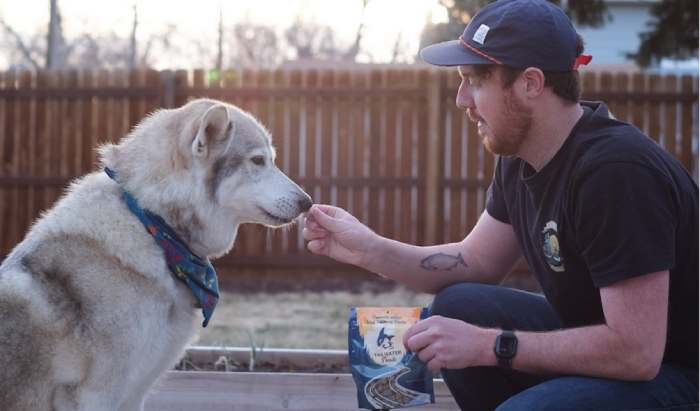Is Palm Oil Bad for Dogs? What’s in the pet food you’re feeding your beloved pooch? Many pet food ingredients, such as palm oil, are becoming increasingly popular, but could they be dangerous?
This article will uncover the truth about palm oil and its potential risks for your pup. We’ll explore how it’s used in pet food, its potential dangers, and what you can do to keep your pup safe.
Insight into the Composition and Source of Palm Oil:
You must understand the facts about palm oil before deciding whether it’s bad for dogs. Palm oil is a vegetable oil derived from the fruit of oil palms and used in various products, including baked goods, soaps, and detergents. It’s also a popular ingredient in pet food due to its high efficiency as a source of energy and fat.

Although it’s a highly efficient energy source and fat, palm oil production has become increasingly controversial due to its potential environmental impact. However, sustainable palm oil sources are available as companies increasingly adopt sustainable production methods.
It’s important to note that the potential environmental impact of palm oil production isn’t the only factor to consider when deciding whether it’s bad for dogs.
Risks of Feeding Palm Oil: Identifying Potential Concerns for Canine Health
Feeding your dog palm oil can come with certain risks, so it’s important to understand the potential dangers before deciding to do so. Before considering palm oil as a dietary supplement for your pup, make sure to do your research and compare brands.
Learning about potential health effects associated with long-term use is also key. Adverse effects of palm oil can include gastrointestinal upset, pancreatitis, and even nutritional deficiencies.
To avoid these risks, look for certified organic products, contain natural preservatives, and are free of trans fats and hydrogenated oils.
If you’re still unsure, speak with your veterinarian before deciding. They can help you weigh the learning benefits against the associated risks.
Common Pet Food Ingredients: Recognizing Palm Oil in Commercial Pet Products
Along with palm oil, many other ingredients can be found in pet food products, so it’s important to know what to look for.

Common ingredients to look for when selecting pet food include:
- Meat and other animal products
- Fruits and vegetables
- Exotic ingredients and meat substitutes
It’s important to look for high-quality proteins like eggs, lean meats, and grains like corn and whole grains. Fruits and vegetables provide essential vitamins, minerals, and antioxidants, while exotic ingredients and meat substitutes such as beans, tofu, and quinoa provide a variety of nutrients and flavors to pet food products.
It’s also important to check the label to ensure all ingredients are safe for the pet. Doing so can help ensure the pet gets a balanced, healthy diet.
Alternatives to Palm Oil: Exploring Safer Options for Canine Nutrition
Considering the potential health risks associated with palm oil, knowing the alternatives for feeding your pup is important. Sunflower, canola, and olive oil are all natural sources that provide essential fatty acids. Avocado oil is another great option rich in vitamin E. Soybean oil is also popular and produced sustainably. Flaxseed and hemp oils are additional plant-based alternatives high in omega-3 fatty acids.
These oils can be used in homemade dog food recipes or as a supplement but shouldn’t replace the primary source of nutrition in your pup’s diet. Ultimately, researching the natural sources and sustainable production of alternative oils is key for making an informed decision about your pup’s health.
Safety Tips for Feeding Palm Oil: Guidelines for Responsible and Informed Usage
Despite the potential risks of palm oil, it can be safely fed to your pup if done with caution. Here are some tips to keep in mind when feeding your pup palm oil:
- Ensure that your palm oil is high quality and safe for consumption.
- Store the palm oil in a cool, dark place to maintain its nutritional value.
- Monitor the palm oil your pup consumes to ensure they aren’t eating too much.
Feeding your pup palm oil can benefit their health, but it’s important to ensure it’s done cautiously. Be sure to check the labels of any palm oil product you purchase, and always consult with your veterinarian if you have questions or concerns. These safety tips can help ensure your pup gets the best nutrition from palm oil.
Frequently Asked Questions:
It’s best to avoid feeding your dog palm oil, as alternative diets may be more beneficial for their digestive health. Limit palm oil consumption and consult your vet on a balanced diet.
Did you think feeding your pup palm oil was a good idea? Surprise – it could cause allergic reactions! Be sure to follow the feeding method advised by your vet to keep your pup safe and healthy.
Yes, palm oil can have nutritional benefits for certain dog breeds, but it can also cause food allergies and health risks. So, please consult your vet before adding it to your dog’s food.
Yes, palm oil can be bad for cats too. Dangers include digestive upsets and possible side effects like vomiting and diarrhea. Consult your vet for advice before giving your cat any palm oil.
Feeding your pup palm oil can be as risky as walking on thin ice – allergies can arise, and following guidelines is important. Long-term effects can include itchy skin, ear inflammation, and digestive issues. Monitor your dog’s reaction and consult your vet for tips on safe feeding.
Conclusion:
Palm oil can be dangerous for dogs if not handled with extreme caution. Feeding your pup even a small amount of palm oil could lead to major health problems that could be life-threatening.
The best thing you can do for your four-legged friend is avoid palm oil altogether and stick to trusted ingredients. After all, your pup’s health is worth a million times more than a few extra ingredients!

Hey there, I’m Janet Brooks, a dog-loving student from California. I’m all about helping pups in need, especially those without homes. Me and my awesome friends work together to give shelter and love to stray dogs. Oh, and I also write blogs about dogs to share helpful info.